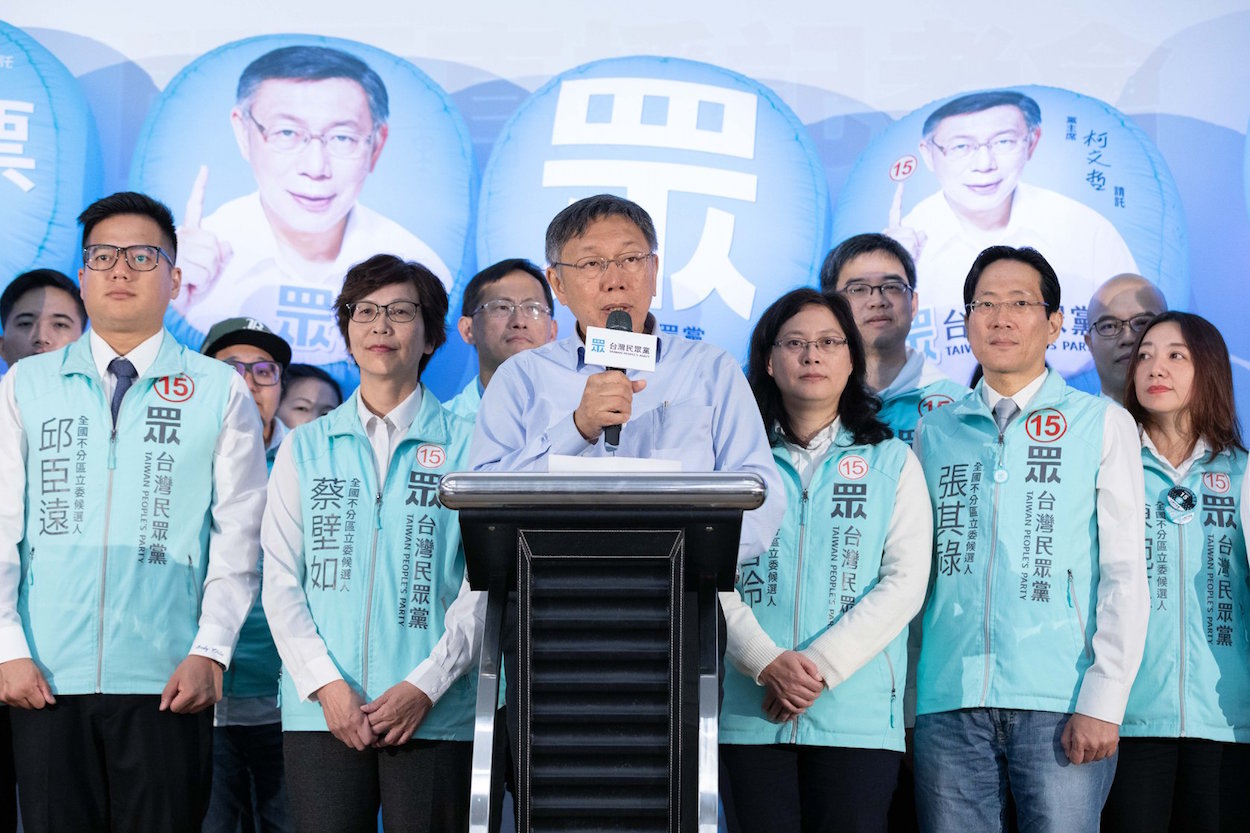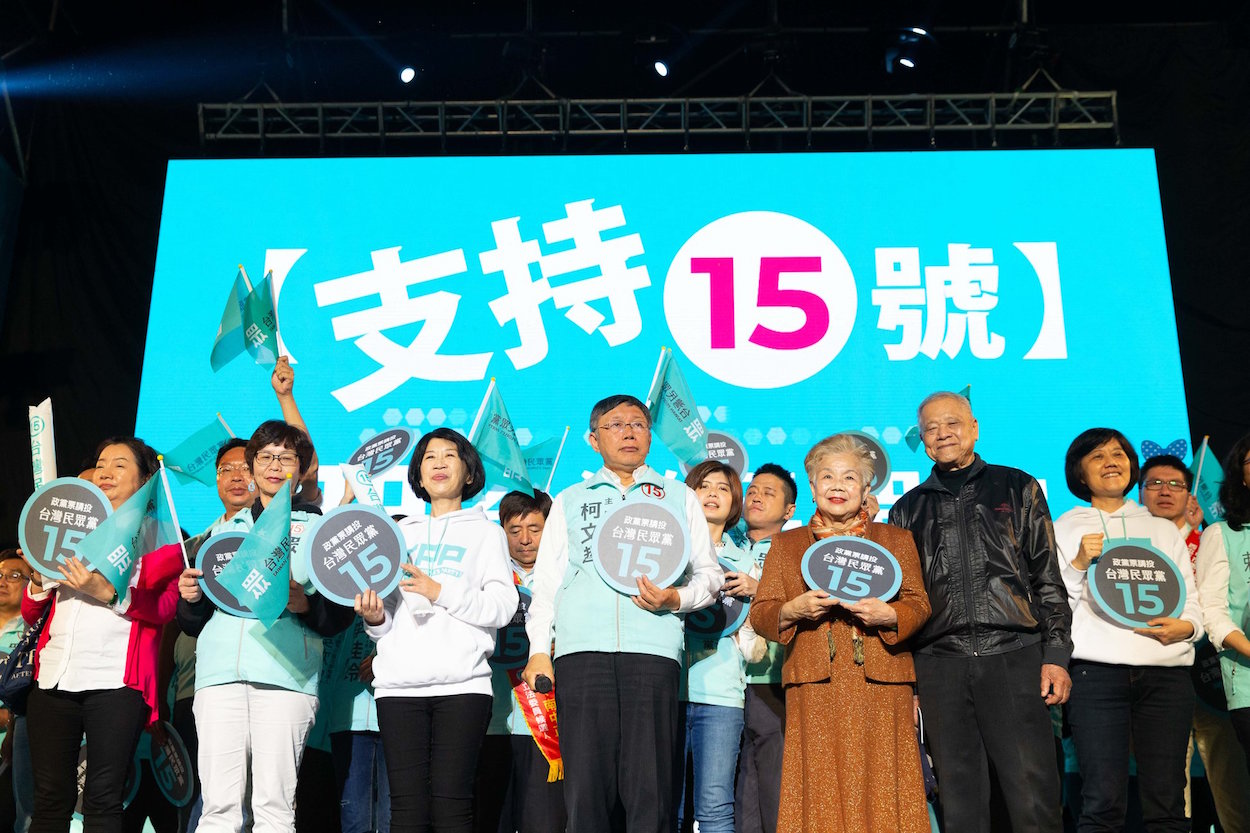by Brian Hioe
語言:
English
Photo Credit: 柯粉俱樂部/Facebook
KO WEN-JE’S Taiwan People’s Party (TPP) may be the largest uncertain factor after the results of the 2020 elections, seeing as the party is a newly emergent political force.
With five seats in the Taiwanese legislature, the TPP is now the third-largest party in Taiwan and is comparable in size to the 2016 NPP. This is an impressive accomplishment, in consideration of that the NPP was a party that originated from the Sunflower Movement, and which had the momentum of one of the largest social movements in Taiwanese history behind it. That being said, the TPP’s legislative seats are entirely due to the party list vote, with the party having won no seats through running district candidates.
 Photo credit: 柯粉俱樂部/Facebook
Photo credit: 柯粉俱樂部/Facebook
In examination of the TPP’s five legislators, who are they? The TPP’s five legislators are revealing of a primarily pro-business, technocratic orientation for the party—which may not surprise, given Ko’s claims to put aside politics to focus on effective administrative management of Taipei. But despite the TPP’s claims to be beyond pan-Blue and pan-Green political distinctions, the TPP’s political orientation ultimately slants toward the pan-Blue camp.
The number one candidate on the TPP’s party list is Lai Hsiang-ling (賴香伶), the director of Taipei’s Department of Labor under Ko Wen-je since 2014. Lai is a well-known labor activist, primarily active in the 1990s, and affiliated with the Raging People Act Now (人民火大行動聯盟) grouping. However, members of Raging People Act Now have been accused of drifting toward the pro-unification left in recent years.
Key figures of Raging People Act Now as Zheng Cun-qi (鄭村棋), who served as head of the Taipei Department of Labor under Ma Ying-jeou’s mayorship, and Hsia Lin-ching (夏林清), who came under fire in 2016 for her handling of a sexual assault at Fu Jen Catholic University’s Department of Psychology, are generally known as pro-unification. Apart from that this suggests that Lai herself may slant toward the pro-unification camp, it probable that Lai’s presence on the TPP’s party list was intended to bolster the TPP’s attempts to claim to be a progressive political party, given her background in labor activism.
 Photo credit: 柯粉俱樂部/Facebook
Photo credit: 柯粉俱樂部/Facebook
The number two candidate on the TPP’s party list is Chyi-Lu Jang (張其祿), an academic with a background in public policy and administrative management currently teaching at National Sun Yat-Sen University. Though he has denied it, Jang has been accused in the past of supporting the CSSTA trade agreement that the Ma administration intended to sign with China in 2014, as part of the series of events that precipitated the 2014 Sunflower Movement.
The number three candidate on the TPP’s party list is Ann Kao (高虹安). Kao is primarily known as the former head of the big data department at FoxConn and a close confidant of FoxConn CEO Terry Gou, Gou having recently been unsuccessful in a bid for the KMT’s presidential nomination. As someone holding a senior position at FoxConn, Kao serves as a link between the TPP and Terry Gou, despite the currently ambiguous relationship between Gou and the TPP after Gou decided to not enter the TPP and to endorse both the PFP and TPP. Kao’s presence on the list is also at odds with the presence of Lai on the list, seeing as FoxConn is infamous as a company for driving its Chinese factory workers to suicide, and Lai is known for labor activism.
The number four candidate on the TPP’s party list is Chiu Chen-yuan (邱臣遠), entrepreneur and secretary-general of the World Taiwanese Chamber of Commerce (WTCC or 世界台灣商會聯合總會). As a business organization, the WTCC represents Taiwanese business interests primarily in North America, Asia, Europe, and Africa.
 Photo credit: 柯粉俱樂部/Facebook
Photo credit: 柯粉俱樂部/Facebook
The number five candidate of the TPP is Tsai Pi-ru (蔡壁如), a physician and trusted confidante to Ko currently working in the Taipei mayoral administration. Tsai’s presence on the TPP’s party list seems primarily to support Ko, then.
Indeed, the pan-Blue leanings of the TPP may not surprise. The TPP is ultimately a political party built around Ko, the party leader, and founder, and so long as it is centered solely around Ko’s political career, the party lives and dies with Ko. For the TPP to grow will rely on its five legislators developing reputations in their own rights, as distinguishable from their affiliation with Ko.
It is true that there are TPP members drawn from the pan-Green camp. But one notes that in spite of his public claims to be non-partisan, Ko has determined the political orientation of the party in making significant efforts at outreach to heavyweights of the pan-Blue camp such as FoxConn CEO Terry Gou and former Legislative Yuan majority speaker Wang Jinpyng. Ko has made no corresponding outreach to major figures of the pan-Green camp, instead verbally attacking Tsai, Chen Chu, Lin Fei-fan and other DPP members.
However, apart from Ko, even if the TPP’s five legislators are able to build public reputations of their own, given their leanings toward the pan-Blue camp, it is probable that the pan-Blue nature of the TPP will grow increasingly visible as time goes by. This should be clear in the coming months.

